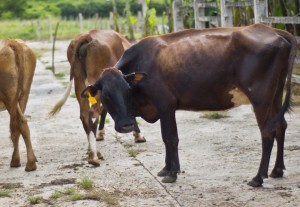
The crime of cattle raising
Guillermo Rodríguez Rivera
HAVANA – I wish to make clear that I chose philology as a profession and teaching as a trade, but I cannot avoid worrying about the problems of my country, which are many. And many of them apparently cannot be solved by anyone, although they can be worsened by many.
Worst of all, there are no journalists who look into them.
When the Revolution triumphed, Cuba had more heads of cattle than inhabitants.
Research done back then showed that a high percentage of the Cuban population did not consume beef. What they consumed was an indescribable “picadillo” where almost everything else was ground in. “Choice beef” was not consumed by everybody. Of course, a quota of meat for children, the elderly and the infirm was guaranteed.
The revolution established the ration book in 1962 and forced everyone to buy meat, if not to eat it, because those who wouldn’t eat it knew that they could resell it at a higher price. Beef could be found only in some fine restaurants and frequently disappeared for a period of time.
With the dollarization of the economy, beginning in the 1990s, beef began to appear in the hotels that catered to foreign tourists. On occasion, it was sold in some hard-currency stores at sky-high prices.
A long time ago, those stores automatically tripled the prices of the products they sell. They have a monopoly on the market and can sell at the price established by the institutions that control them.
The restraints on beef consumption – the near ban on its consumption – led to illegality. Onto the scene came the slaughterers who killed stolen cattle.
Beef was sold at 2 dollars per pound.
In the wake of illegality came the laws to stop it.
Everyone was absolutely forbidden to slaughter cattle, even their owners. If, for example, a traffic accident or a fallen power line killed a calf, that meat could not be consumed; it was incinerated in the presence of authorities appointed to that task.
If a head of cattle was stolen from its owner, it was almost impossible for the police or the rural constabulary to find it. Instead, the owner who had lost it was invariably fined for his carelessness. In fact, the authorities believed that the animal had been slaughtered with the owner’s consent and fined him for that reason.
Choice beef was sold to the tourism industry at very high prices, but the state paid a ridiculously low price for a bullock or a steer.
When a farmer’s cow has a calf, a male, the most profitable thing to do is to let the animal starve to death, because the farmer cannot slaughter it, and the milk the calf would drink until he could graze would be more valuable than the money the government would pay the farmer for the reared calf.
No farmer kills a milk cow, but the desire to preserve a drove of cattle that doesn’t increase has led to absurd laws that force the farmer to avoid rearing large cattle.
It is a lot more comfortable and profitable for the farmer to raise pigs, which he sells at market prices and slaughters for consumption whenever he wants. Nobody can fine him for anything.
When I was a commentator for the program “Prologue” and for a similar section of “Write and Read,” we were recording one afternoon and the defects of the old video cassette used by the studio technician caused the taping session to be interrupted repeatedly.
A frustrated cameraman made a comment I’ve never forgotten: “Gentlemen, if we go on like this, we’ll be here until beef is sold unrestrictedly.”
Considering the methods we apply, the day when beef is sold unrestrictedly will also be the day when hell freezes over.
Guillermo Rodríguez Rivera is a philologist, poet, writer and professor at the University of Havana.
Note from Progreso Weekly: This article by Prof. Rodríguez Rivera reached us by e-mail, without any indication of the original source. Because we are familiar with the author’s style and typical humor, we are publishing it without reservations.

